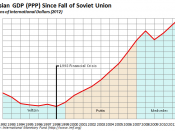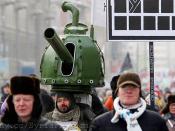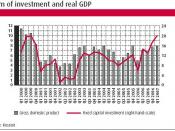ECONOMIC ANNALYSIS OF RUSSIAN FEDERATION A decade after the collapse of the U.S.S.R., Russian Federation, while still struggling to establish a modern market economy and achieve sustainable economic growth, has just completed its third year of strong economic growth. Up until 1999, Russian GDP had contracted an estimated 43 percent from 1991, including a five percent drop in 1998, despite the country's wealth of natural resources, its well-educated population, and it?s diverse although increasingly dilapidated industrial base.
By the end of 1997, inflation had been brought under control, the ruble was stabilized, and an ambitious privatization program had transferred thousands of former state owned enterprises to private ownership. Some important market-oriented laws were also passed, including a commercial code governing business relations and an arbitration court for resolving economic disputes. In 1998, as the Asian financial crisis spread its contagion through the developing world and oil prices dropped sharply, Russia's earnings from oil exports fell precipitously, and the government budget was in chaos.
During 1999, world oil prices rebounded, and with much lower ruble costs, the Russian oil industry invested to ramp up production. Rising exports and energy-related investment helped the economy start growing again; GDP grew by 3.2 percent in 1999. In 2000, with oil prices hitting their peaks for this cycle, investment spending and export earnings strengthened further, powering the economy's growth at a torrid 8.3 percent annual rate.
The government budget came in approximately in balance and Russia repaid an estimate US$17 billion in international debt, reducing the external debt to about US$135 billion by year-end 2001. While the Russian economy, with establishment of political stability under President Vladimir Putin and the unexpected aid of high oil prices, has made some big advances in the past three years, many problems remain on the path to sustained, diversified growth. At present, the economy is far too dependent on energy and energy exports. A major part of the problem is that, as a legacy from the USSR, Russia has not allowed domestic prices for energy to rise to world levels. In some cases, domestic consumers pay 10 percent of the world price, depriving the energy sector of funds urgently needed for new investment and to repair aging Soviet-era infrastructure and sending wrong signals about the value of energy in business and home use.
Russia has large oil reserves (50-55 billion barrels) and truly gigantic natural gas reserves (1700 trillion cubic feet) and it has substantial pipeline capacity to deliver its petroleum production to the west. However, most of the pipelines date from the Soviet era and are in need of significant refurbishment, upgrading and expansion. To keep its current level of oil production from declining, Russia needs to invest huge sums over the coming years in well maintenance and development as it is currently producing the equivalent of two million barrels per day of oil more than it is replacing in new proven reserves. And, realizing the enormous potential of its natural gas resource base will take another huge dose of investment.
Russia's transition to a market economy has also been slowed by pervasive corruption in government and a weak judicial system that has difficulty dealing with the growing incidence of payment arrears among Russian consumers and businesses. Almost seventy percent of total external obligations of about US$135 billion (about 50 percent of GDP) originate from the Soviet era, which the Russian government now regrets having assumed. Hopes of debt rescheduling and partial forgiveness have not been fulfilled so far and Russia is not as heavily indebted as many other countries who are receiving debt relief from international creditors. Russian support for the U.S.-led international coalition against terror in the aftermath of the terror attacks in September 2001 bolstered Russia's ties with the U.S. and other Western nations, opening new opportunities for economic cooperation and raising the probability of early entry into the WTO.





